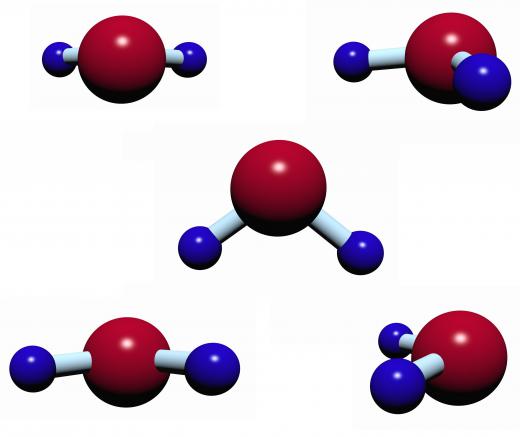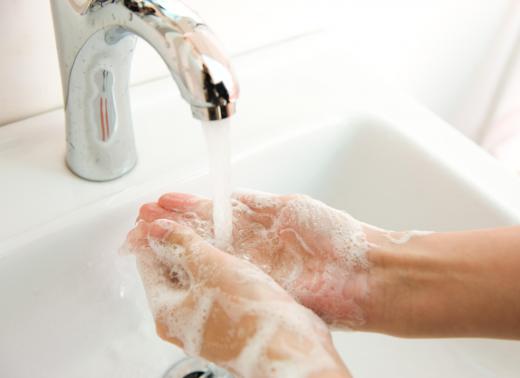What are the Properties of Water?
About 70% of the Earth is covered by water. The different properties of water allow it to be labeled as one of the most important substances to life on the planet, and much of it has to do with its chemical structure. For instance, the way the hydrogen and oxygen are bonded allows the molecule to dissolve different substances. In addition, the way in which water freezes allows for aquatic life to survive throughout the winter.
Two properties of water are the melting and boiling point. The melting point of water is 32°F (0°C), and the boiling point is 212° F (100°C) at atmospheric pressure. The addition of pressure will increase the boiling point, and reducing the pressure will cause the boiling point to fall. Therefore, water boils at 156° F (69°C) on Mount Everest and at 256°F (about 124°C) at 15 PSI (107 kPa), the pressure under which many pressure cookers operate. Pressure can also cause the freezing point of water to decrease.

Water is made up of two hydrogen and one oxygen atoms. The arrangement of these atoms is what makes water such a great solvent. Rather than being arranged straight across, the two hydrogen molecules are at a 104.5° angle, making the molecule look like a silhouette of a cartoon mouse. This allows one side of the molecule — the oxygen side — to be negative while the other side — the hydrogen side — is positive. The different charges allow various types of substances to dissolve in water.

Since water has this unique makeup, it is called a universal solvent. Different substances from sugar, to salt, to acids such as vinegar are able to be dissolved in water. This is good news for people who are trying to get water-soluble minerals into their diets but bad news for anyone trying to dissolve oil in water. Ironically, the same property that makes it possible for water to be a universal solvent is what causes this phenomenon. Oils and fats do not have a charge, and the water molecule is more attracted to itself than the fat and so will pool to one area.

Another of the interesting properties of water is its high specific heat. Specific heat is the measurement of how much heat it takes to raise the temperature of 1 gram of water 1°C. Water can absorb a lot of heat without changing temperature, and so it has a high specific heat. This results in water cooling down and heating up much more slowly than the air around it.

Ice also exhibits an interesting property. When most things freeze, they become dense and will sink to the bottom of their liquid versions. Water does become denser as it cools, but as it approaches freezing, it starts to become less dense and floats. This phenomenon helps aquatic life survive in larger lakes throughout the winter. The surface of the water will freeze, leaving the water below unfrozen.
AS FEATURED ON:
AS FEATURED ON:














Discussion Comments
@feasting – That is so frustrating! Another property of water that frustrates me is the fact that it won't mix with oil.
Whenever I try to rinse out an oily pan in a hurry, the water really does nothing to eliminate the greasiness. It might be able to flush out the majority of the oil, but the slick residue remains.
I absolutely have to use soap and hot water together in order to clean oil or grease out of a pan. A simple rinse job won't do.
Water seems to take forever to boil! Even when I turn the stove on high, I can't get over how long it takes.
The only way to make it go any faster is to put a lid on the pot. This traps the heat and adds to the temperature inside the pot.
It is weird how the surface of water gets iced over before the middle and bottom do. I live next to a pond, and I have seen giant sheets of ice only an inch thick floating on top of the pond before.
If I press down on the ice with my foot, it sinks a little and starts rocking back and forth. Water gets on top of the ice and sloshes around.
It never gets cold enough where I live for the pond to freeze solid. So, I never get to ice skate. Even if the pond did freeze more deeply, I would be terrified of the ice breaking under the pressure of my body weight.
I have witnessed water taking longer to heat up and cool down than the air does. I have an above ground swimming pool, and I get really impatient waiting for the water to get warm enough to swim in.
Even by late May, when the temperature has been in the nineties for a few weeks, the water is too chilly. I have to wait until about the second week of June for the water to become warm enough for me to tolerate it.
Then, I've noticed that on really hot days in the middle of summer, the pool water seems to get warmer as the sun sets. What is actually happening is that the air is getting cooler while the water is staying the same temperature, so it just feels warmer. Either way, it makes for a really pleasant time to swim.
@wecallherana - Those were some great additions to the whole chemical properties of water thing going on here. I really agree with you and think that people don't realize how important water really is to us. People drink soda and coffee and tea because they think it's going to help them stay awake or it tastes better, but that's not the truth. Even juices which contain a lot of sugar. Thankfully, there are sugar free drink packets nowadays that work wonders with my kids and they have been drinking so much more water!
@gameaddicted - Water is pretty much the basis of life if you think about it. Aside from the fact that water covers the earth, is in our bodies, and sustains plant life it is also important just in general. It's essential for weight loss and working out as well as becoming healthier. While the physical properties of water is an important thing to know the truth is that it's more important to know what water can do for you and the planet.
There are many different uses of water, but the most obvious is dilution. I think that a lot of people discount water and its ability to flush toxins out of the body. Many people rely on water as a healing element and find the sound of things like rain or waterfalls relaxing a something that helps them get rid of their stress.
Post your comments